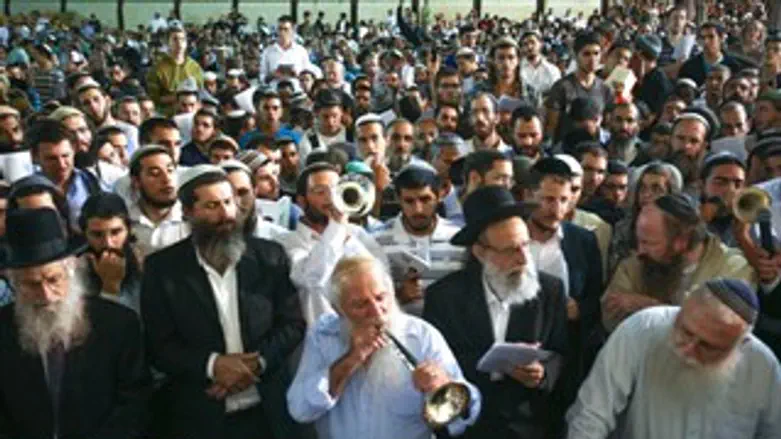
Friday is the first day of the month of Sivan, the month in which the Torah was given by the Almighty to the Jewish people at Mount Sinai. It was quiet then. Not a creature stirred. Everyone hearkened to the voice of G-d proclaiming the Ten Commandments.
The first day of the month of Sivan is that one day a month chosen by the group which calls itself the"Women of the Wall (WoW)", for an appearance at the Kotel Plaza.
Friday, please G-d, my grandson is to don his tefillin for the first time at the Kotel. He doesn't know how to provoke his parents, let alone other worshipers. The "Women of the Wall" will do their best to ruin our joyous occasion - we have already been told that we will have to walk from Jaffa Gate, limiting the guests to those capable of that, and that the yeshiva we were supposed to have our breakfast in will be impossible to reach - and that made me think of how many happy family occasions the WoW have already managed to disrupt. I regret that I selfishly did not realize this before it affected me and wrote only of their lack of basic respect and civilized behavioral norms in trying to force change at a holy site.
The members of this group have been fighting with all the means at their disposal – the media, the internet, the courts, with everything but numbers, as large numbers of women are obviously not at their disposal – to be allowed to show contempt for the accepted customs for praying at the Kotel, a site that merits respect for its tradition. There are barely fifty of them on a really good fighting day, but this is hard to tell because of the noise they generate and all the media hype they receive.
Don't think it is just hareidi worshipers who are offended. Many, if not most, religious Zionist worshipers find their actions at the Wall just as offensive. Look at the picture accompanying this article (click opeds on the menu at the top of the page) and see who forms the majority at the Wall.
What is certain is that they are disrupting an existing, well established situation. In the days of the British Mandate and the Ottoman Empire, Jews could not request their own customs at the site, but they established them firmly as Orthodox ones in 1967. And in the Holy Temple, women did not don tallit and tefillin or carry a Torah scroll.
What one can count on is that the WoW generate vociferous conflict. Because despite the opposition to their reading of the Torah on the part of those thousands who pray at the Kotel regularly and despite repeated requests by the rabbi of the Kotel – the group will not pray at the beautiful area set aside for them at Robinson's Arch, a continuation of the same ancient Kotel, and insist on changing the customs at the main Kotel Plaza. They know that this will cause disruption. They know that they offend a great many people. They don't care.
It is not hard to imagine what would happen if they were Christians who tried to change the traditional service to that of some obscure sect at the Vatican or Moslem women who decided to pray in their own fashion in Mecca. In Israel, however, they have no such fears. Here they are even touted as liberating, fighting for human rights, etc. by our leftwing media – when all they are doing is being rude and impolite towards the majority. And this goes on after there is a solution.
And there are halakhic questions. While there are rabbis who allow women to wear prayer shawls and tefillin, just not at the Kotel where established custom forbids it, women can not be counted as part of a prayer quorum (minyan) and therefore when praying in a women's prayer group must not recite the kaddish and kedusha prayers. The same applies to the blessings before and after reading the Torah. What the WoW do on those issues is unknown, but the Kotel is not open to services that transgress halakha, and neither was the Holy Temple that once stood behind it.
No matter what the courts decide, if I were told that I offend someone at a holy site, if I knew that the current tradition did not allow my way of worshipping, and was offered another site with the identical holiness, I would go there without hesitation. I would invite all the people who agree with my form of service to join me and fill that area with them. The only thing missing would be the conflict and the media, but perhaps the media would come even if there were no shouting.